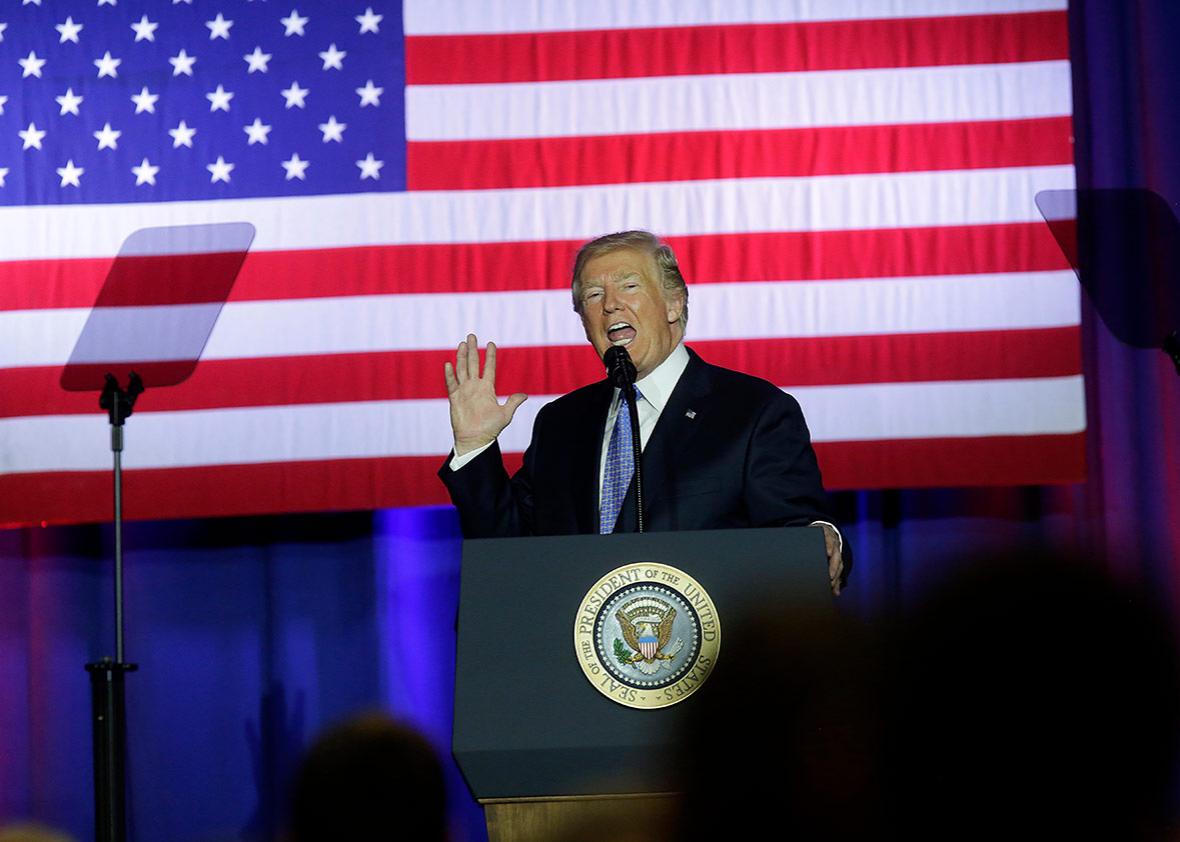President Trump presents himself as a hard-nosed enforcer. He likes to talk tough about terrorists, criminals, immigrants, and refugees. But there’s one group of people he doesn’t like to target: the rich. Trump’s policies, such as the tax-cut plan he unveiled this week, favor billionaires and multimillionaires like him and his economic advisers. But Trump has developed a trick for hiding this soft spot. He plays a card from his macho repertoire: nationalism.
Deference to the rich is a Republican staple. Conservative politicians might lambast Sharia, welfare bums, and college professors, but when anyone asks why their tax or regulatory policies benefit the wealthy, they cry “class warfare.” The real enemy, Republicans argue, is the government. That’s how Gary Cohn, the director of Trump’s National Economic Council, defended Trump’s tax-cut plan on Thursday when reporters pointed to elements of the plan that would serve the rich. Never mind that, said Cohn. “What the American people are concerned about is their financial position,” he argued. “How much do they get to keep? How much goes in their pockets versus how much goes to the government?” At a press briefing on Wednesday, House and Senate Republicans made the same point.
Trump is different. He ran for president as a champion of working people who were being shafted by the global economy. Outlining his tax-cut proposal on Wednesday, Trump said it would serve the middle class, not the rich. But in the face of data indicating that the savings would go largely to high earners, Trump brought a new argument to the table: He urged the public to focus on country. The tax plan was “pro-American,” he argued, and it would “take care of our people” for a change.
Trump’s innovation is to adopt a common Republican talking point and filter it through his nationalist lens. Take “competitiveness.” This is a favorite Republican term, since it frames deregulation and tax cuts—which from a progressive standpoint, are a concession to the GOP’s donor class—as self-discipline and strength. In his speech, Trump cited his host state, Indiana, as an example. “This state has claimed a powerful competitive edge built on low taxes and less regulation,” said the president. “Indiana has welcomed dozens of companies fleeing high taxes and high-tax states.” That’s the typical GOP line. But Trump went on:
We want to do the same thing for America, making our country more competitive with other nations. … We let other nations come in and take advantage of us and take our jobs away and take our businesses out. And we’re stopping that … We have surrendered our competitive edge to other countries, but we’re not surrendering anymore. … We will dramatically cut the business tax rate, so that American companies and American workers can beat our foreign competitors and start winning again.
This is classic Trump: Foreigners are taking advantage of us. We’re not going to surrender anymore. We’re going to compete and win. But to get tough on these countries, we have to be nicer to CEOs and investors. We have to give them a giant corporate tax cut.
When a farm worker enters this country illegally, Trump wants him hunted down and deported. When a football player kneels for the national anthem, Trump wants him fired. But when an American company makes money overseas and stashes the profits abroad to avoid U.S. taxes, Trump doesn’t impugn the company’s patriotism. He says it’s America’s fault for taxing businesses too heavily.
How does Trump sell this corporate suck-up message to the workers who voted for him? By telling them we’re all on the same team. “We want our companies to hire and grow in America and to raise wages for American workers and to help rebuild American cities and towns,” he told the audience in Indiana. “That is how we will all succeed together and grow together as one team, one people, and one American family.” On Friday, speaking to the National Association of Manufacturers, Trump returned to this theme. “The era of economic surrender is over,” he declared. “We will dramatically cut the business tax rate so that American companies and workers can beat our foreign competitors.”
Trump’s nationalism fits the Republican agenda like a glove. On the surface, he’s an unconventional populist who threatens foreign trading partners on behalf of “the forgotten man and woman.” In reality, his tax-cut package, loaded with conventional ideas such as repeal of the estate tax and the alternative minimum tax, serves the donor class. But quarreling about that would be unpatriotic. Don’t ask how much of the money is going to the rich, says the president. Ask what you can do for your country.
